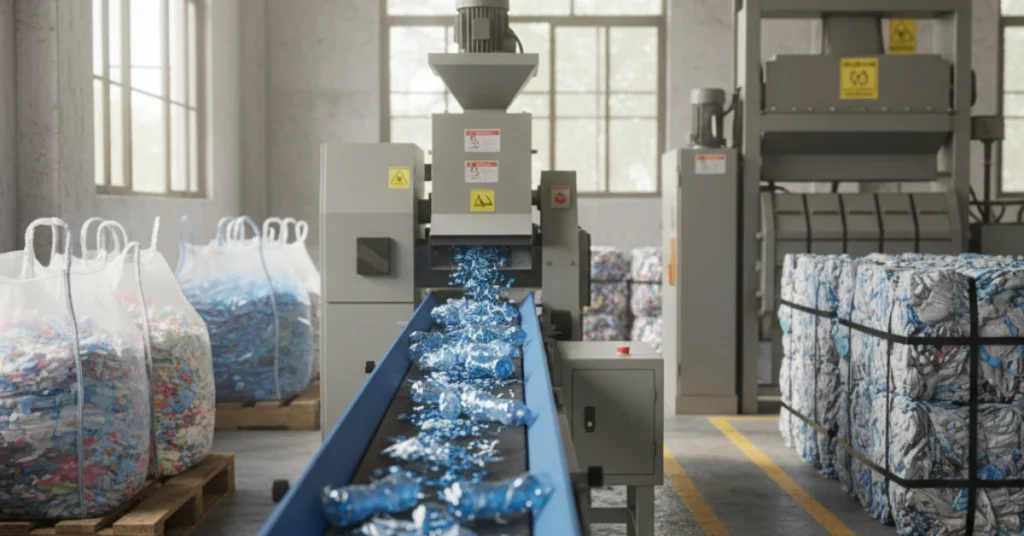13 Plastic Business Ideas to Start from Your Small Plant

If you’ve been considering manufacturing in India, the plastics sector is impossible to ignore. What’s notable is that India’s per capita plastic usage is still much lower than most other developing markets. In other words, there is room for the industry to grow, especially in specialized niches where quality, reliability, and consistency of supply mean much more than mass production.
Profitable Plastic Manufacturing Ideas
The market for basic plastic products is highly competitive and price-driven. This is one of the reasons why entrepreneurs are looking toward niche manufacturing and value addition in recycling to create scalable and future-ready ventures. This article goes deep into each plastic business idea, outlining material requirements, investment range, demand, and profits.
PVC Wire & Cable Manufacturing
PVC wires and cables are indispensable in every house, commercial building, factory, or real estate project. The entrepreneur can initiate a manufacturing unit for the production of PVC-coated domestic wiring cables, appliance wiring, and flexible cables. To differentiate, it has to be fire-resistant quality, meeting BIS standards, with the sourcing of reliable copper/ aluminium conductors. The business scales well with B2B partnerships, dealer networks, and collaborations with electrical contractors.
Investment: ₹12 lakhs to ₹2 crores (depending on plant capacity & automation level)
Market: Electrical wholesalers, hardware stores, real estate developers, local electricians, and appliance manufacturers.
Profit Margin: 15–28% margins, with higher gains through bulk supply and brand building within the local market.
PVC Insulation Tape Manufacturing
Electricians, households, factories, and construction sites all use PVC electrical insulation tape every day. For this reason, it is a very profitable, steady-demand niche in the PVC business. Manufacturing entails mixing PVC resin with adhesives and dyes, applying it onto film, and then cutting it into rolls. The business enjoys low wastage and fast production cycles, with the option to launch multiple variants in colours, thicknesses, and branding.
Investment: ₹6 lakhs to ₹35 lakhs, depending on machine automation and scale.
Market: Electrical shops, hardware stores, industrial suppliers, electricians, e-commerce listings (visibility of the local brand is important).
Profit Margin: 25–40% margins, with the potential for recurring monthly orders from B2B buyers.
HDPE/ Plastic Jerry Cans Manufacturing
HDPE jerry cans are widely used for storing and transporting liquids like lubricants, edible oils, detergents, water, chemicals, and agricultural inputs. Their durability, leak-proof design, and corrosion resistance make them a daily need across industries and household use. This business benefits from repeat bulk orders, especially from local manufacturing units and distributors.
Investment: ₹18 lakhs to ₹2.5 crores – depending upon the production capacity, mould variety, and automation.
Market: chemical companies, food and oil manufacturers, paint companies, hardware suppliers, and rural/urban wholesale markets.
Profit Margin: 18–30% margins, with higher profits on customised industrial bulk orders.
PVC Battery Container Manufacturing
Battery containers made of PVC serve to safely house the battery cells while providing heat resistance, chemical stability, and longer life. Manufacturing requires moulds, heating/moulding machinery, and high-quality PVC resin. The best part is that this business connects you directly to high-growth industries related to renewable energy and automobiles. Many manufacturing companies prefer local suppliers due to frequent restocking cycles; hence, opportunities for strong recurring orders abound.
Investment: ₹22 lakhs to ₹3 crores (depending on production scale and mould precision)
Market: Battery manufacturers, inverter dealers, EV battery assemblers, and solar equipment producers.
Profit Margin: 25–38%, with additional gains through specialised or custom-size container supply contracts.
Strip Packaging of Pharmaceuticals
The pharmaceutical industry is seriously dependent on secure, airtight packaging to maintain the quality and safety of medicines. Without entering into this highly regulated medicine manufacturing space, an entrepreneur can profit from supplying this packaging component, which has predictable, high-frequency demand. The machinery required includes strip-sealing machinery, punch dies, printing units, and quality testing systems.
Investment: ₹12 lakhs to ₹1.8 crores – based on machinery type, automation, and production scale
Market: Local pharma companies, contract manufacturing units, hospitals, veterinary medicine suppliers, and wholesale distributors.
Profit Margin: 22-45%, especially on the supply of printed, custom-branded strips to repeat pharma clients.
PET Preform Manufacturing
Instead of providing finished PET bottles, the entrepreneurs can also supply the PET preforms, which are then blow moulded into their final shapes by the bottle manufacturers. This has proved highly profitable because preforms are comparatively easier to produce, store, and ship than finished bottles. Applications of PET preforms would also include mineral water, cold drink packaging, edible oil bottles, pharmaceutical liquids, and even household chemical containers.
Investment: ₹35 lakhs to ₹3 crores, capacity, and automation of machines determine the scale.
Market: Beverage companies, packaged water brands, pharmaceutical suppliers, dairy drink manufacturers, and bottle blow moulding units.
Profit Margin: 20–35%, with large orders secured by offering custom neck sizes (e.g., 28 mm, 30 mm) and transparent supply timelines.
Manufacturing Plastic Spectacle Frames
These are in continuous demand due to the rising number of eyewear users, increasing screen time, and increasing fashion awareness. Manufacturing includes plastic injection moulding, polishing, fitting hinges, and quality testing for comfort and durability. The good part is that this business allows small-batch trendy designs, enabling quick adoption of trends and creating brand identity.
Investment: ₹8 lakhs to ₹1.2 crores (depending upon the complexity of machinery and finishing process)
Market: Optical shops, sunglasses brands, eyewear distribution wholesalers, and online fashion marketplaces.
Profit Margin: 35-55%, especially for the production of stylish or branded frames within the youth fashion segments.
Pyrolysis Oil Production from Plastic Waste
This venture involves subjecting mixed plastic waste, including LDPE, PP, and PE, to high temperatures in the absence of oxygen, between 350°C–500°C, to break them down into a hydrocarbon-rich oil popularly known as pyrolysis oil. This oil is used as an alternative fuel in industries such as cement, general boiler operations, and some chemical manufacturing processes. It solves two very important needs: waste management and alternative fuel supply; thus, it is part of the sustainability and circular economy shift.
Investment: ₹40 lakhs to ₹6 crores, depending on plant capacity and compliance systems
Market: Cement plants, furnace oil users, industrial boilers, waste management firms, and government sustainability projects.
Profit Margin: 25–45%, depending on the sourcing cost of waste plastic and the efficiency of oil output per tonne.
Plastic Waste for Road Construction
In this model, waste plastic shredded are mixed with hot bitumen to improve the strength of roads, therefore giving the surface a crack-resistant and weather-proof character. The business entails the collection or sourcing of waste plastics, cleaning, shredding, and selling to road contractors or directly partnering with municipal bodies. This sector gets encouragement from the government since it solves the challenges of waste management while at the same time enhancing the quality of infrastructure.
Investment: ₹12 lakhs to ₹1.2 crores (depending on shredding machine capacity and sourcing network setup)
Market: Municipal corporations, road construction contractors, PWD projects, and private developers.
Profit Margin: 20–35%, with a possibility of higher margins when contracts are directly won instead of through intermediaries.
3D Printing Filament Manufacturing
Instead of virgin plastic pellets, many manufacturers in the plastics industry now produce filament from recycled plastic; therefore, this is both a futuristic and eco-conscious business. The process happens through shredding, extruding, spooling, and quality testing necessary to preserve exact diameter consistency-usually 1.75 mm or 2.85 mm. This niche is thus appealing to educational institutions, makerspaces, design studios, and industrial prototyping labs.
Investment: ₹18 lakhs to ₹1.8 crores – cost depends on industrial-grade filament extruders and precision testing tools.
Market: Design laboratories, engineering colleges, D2C hobbyist communities, prosthetics manufacturers, and décor/miniature creators.
Profit Margin: 30–50%, especially for speciality filaments like wood-fill, carbon fiber, glow, and recycled eco-filaments.
Acrylic Button Making
Acrylic buttons have gained more popularity among garment manufacturers because they allow flexibility in design, colour blending, thickness, and finishing. Production can also be done at home or with a small workshop setup using moulding machines, dies, cutting tools, and polishing machines. What makes it an attractive business is its custom-order model; the manufacturer can create designs based on fashion trends, boutique requests, and export orders.
Investment: ₹3 lakhs to ₹25 lakhs (depending on machine automation and output scale)
Market: Garment factories, tailor shops, boutique designers, school uniform suppliers, and exporters to Bangladesh, Nepal, and the Middle East markets.
Profit Margin: 25–45%, with the latter figure increasing for bulk school and uniform contracts where demand becomes repetitive and predictable.
Raincoat Manufacturing
The business involves cutting and stitching waterproof fabrics like PVC, PU-coated nylon, or polyester into raincoats, ponchos, and children’s school rain sets. Success in this model comes from offering good fit, durability, and lightweight materials, something mass-produced raincoats often compromise on. Orders can be taken from local garment shops, school uniform suppliers, or RWAs. Custom logo printing for schools and delivery apps creates scope for recurring bulk orders.
Investment: ₹2 lakhs to ₹15 lakhs (fabric stock, sewing machines, heat-sealing tools, packaging)
Market: Schools, uniform suppliers, online marketplaces, monsoon kiosks, rainwear retailers, and food delivery fleet orders.
Profit Margin: 25–50%, maximum profitability during monsoon and school reopening seasons.
Yoga Mat Manufacturing
Manufacturing yoga mats involves material sourcing from the likes of EVA foam, TPE, natural rubber, or cork, among others, with the application of several machines: cutters, laminators, and finishers. Niche branding, such as “eco-friendly mats”, “travel-friendly roll-up mats”, and “extra-thick orthopaedic mats”, can significantly add to selling value. Selling through Instagram, Amazon, Flipkart, and even partnerships with gyms/yoga studios often tends to work better than just following a retail model.
Investment: ₹8 lakhs to ₹45 lakhs – Material moulds, lamination machines, print finishing units.
Market: yoga studios, gyms, fitness trainers, modern retail stores, e-commerce platforms, and corporate wellness gifting.
Profit Margin: 35–60%, especially for premium or natural-material mats with branding and community engagement.
If you are working in related industries, then you might also be interested in reading about the Steel Business Ideas in India pertaining to Small and Medium businesses, since often enough, the supply chains within manufacturing intersect between steel and plastics.
Optimise Your Plastic Production Process
Use the cost estimator below to understand your per-unit manufacturing cost and pricing potential.
Cost Estimator Calculator (₹)
Summary
| Metric | Monthly |
|---|---|
| Units produced | — |
| Total material cost | — |
| Total processing cost | — |
| Overhead | — |
| Estimated monthly profit | — |
Cost Breakdown
| Item | Per Unit (₹) |
|---|---|
| Material | — |
| Processing | — |
| Labor | — |
| Overhead (alloc.) | — |
| Total cost / unit | — |
| Margin (%) | — |
| Suggested price | — |
Recycled vs Virgin Comparison
| Material/unit (₹) | Total cost/unit (₹) | Suggested price (₹) | |
|---|---|---|---|
| Virgin | — | — | — |
| Recycled | — | — | — |
Your Next Steps
The above ideas are not get-rich-quick schemes but rather practical business avenues that boast steady and scalable growth potential. Success comes from choosing the right niche, efficiently controlling the cost of operations, and building trustworthy customer relationships.
These plastic business ideas can pay off well in the long run, provided one acts strategically.
Disclaimer: The information contained in this blog, The Growth File, is intended for general informational purposes only and does not constitute professional advice. Always consult with a qualified professional before making any business decisions based on the information you find on this blog.
What’s New?
-
13 Plastic Business Ideas to Start from Your Small Plant
Business Ideas -
Over 250 Indian Brands Tagline That Left a Mark
Marketing -
13 Dairy Business Ideas with Strong Demand
Business Ideas -
Effective Marketing for Local Businesses in FMCG
Marketing -
14 Steel Business Ideas in India for Small and Medium Enterprises
Business Ideas
